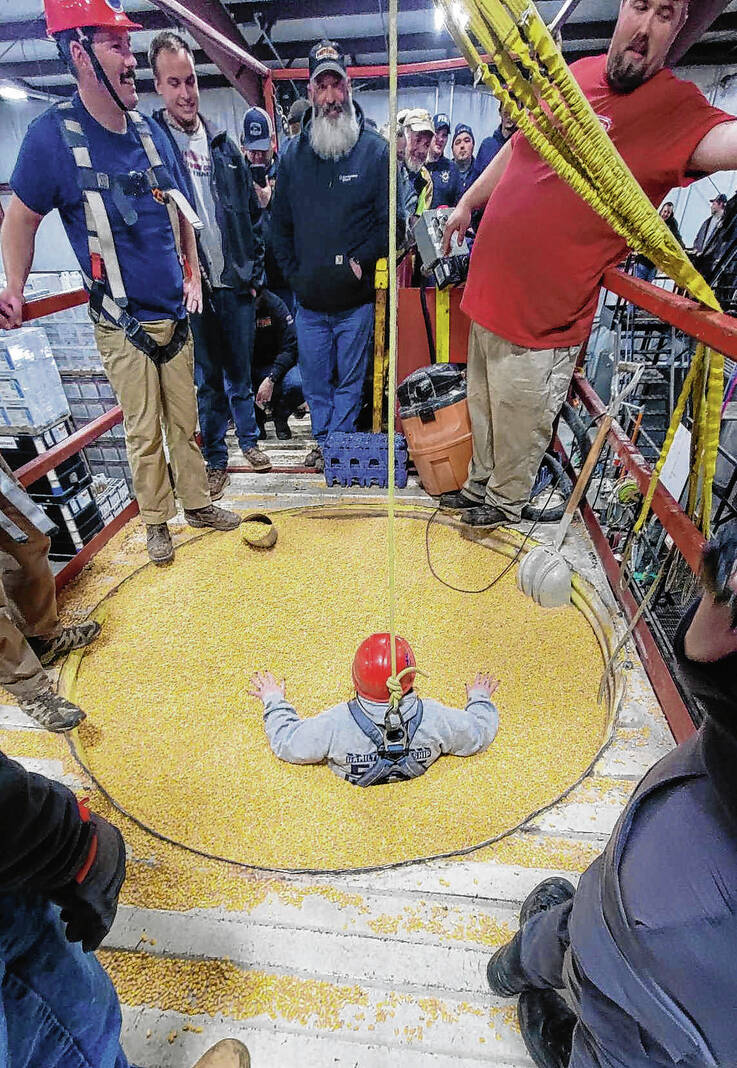
Brittany Wayt with the Hamilton Township Volunteer Fire Department volunteers to be rescued from a grain bin during a grain bin rescue training class Jan. 22 at Premier Ag in Cortland.
Photo by Cody Hercamp
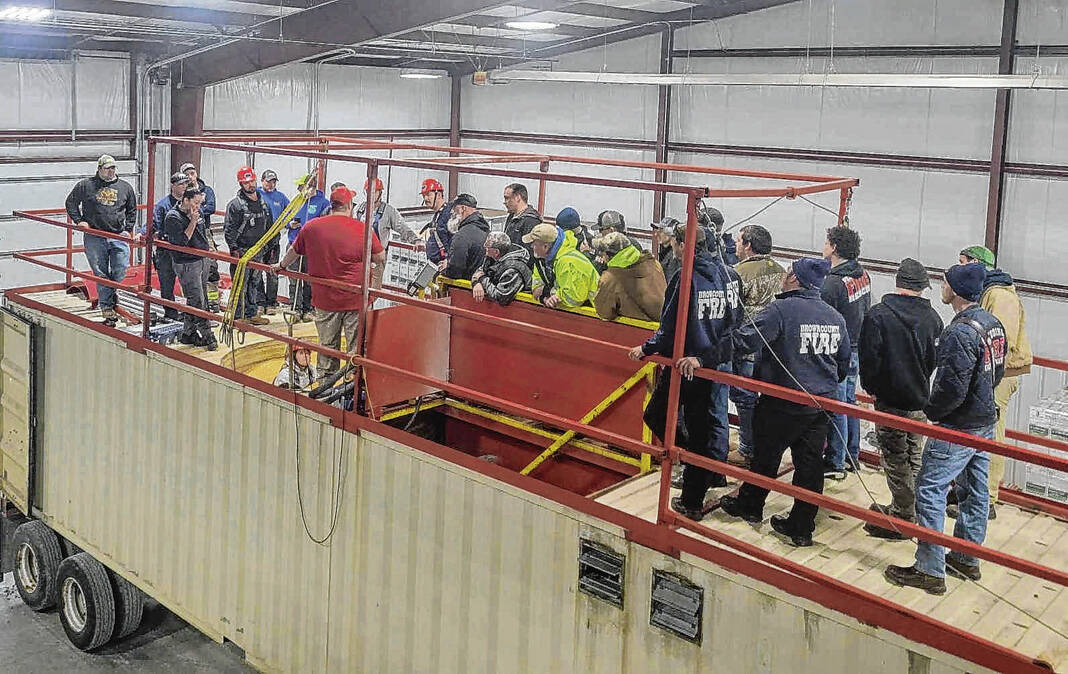
The Safety and Technical Rescue Association of Livonia, Michigan, brought one of its grain bin rescue training trailers to Premier Ag in Cortland on Jan. 22 for area first responders and Rose Acre Farms and Benson Hill employees to receive training on grain bin rescues.
Photo by Cody Hercamp
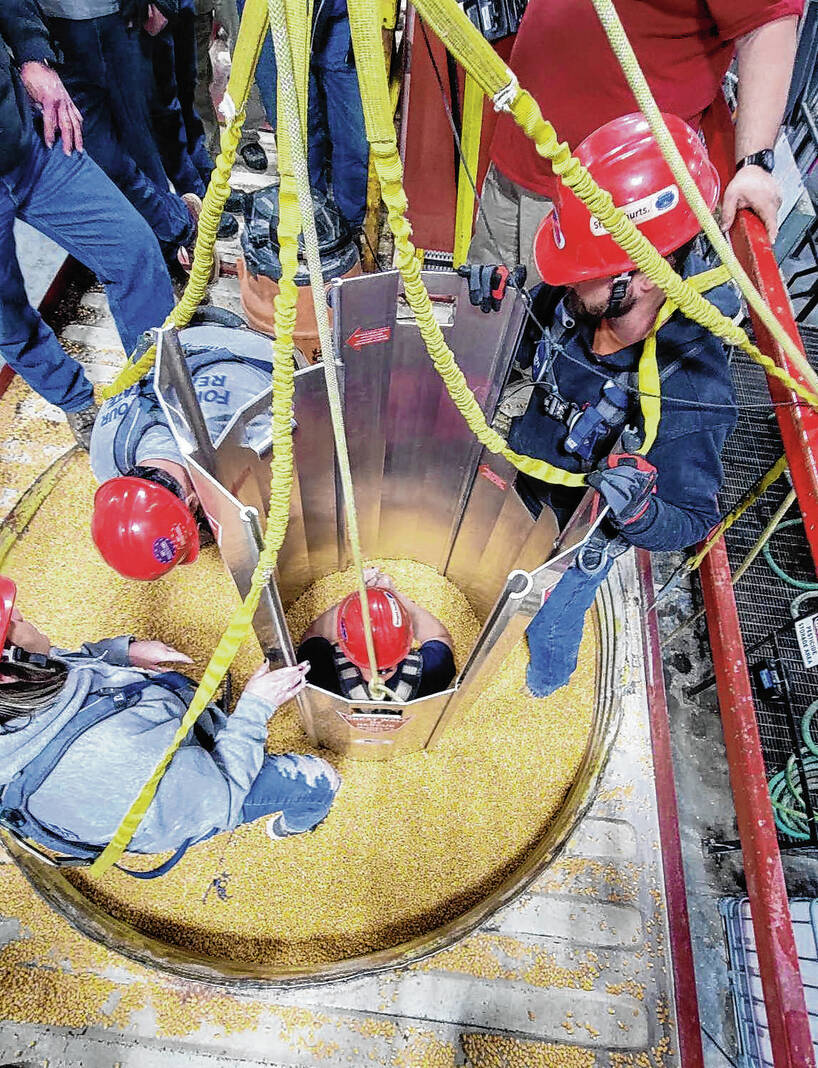
First responders set up a grain bin rescue system during training Jan. 22 at Premier Ag in Cortland.
Photo by Cody Hercamp
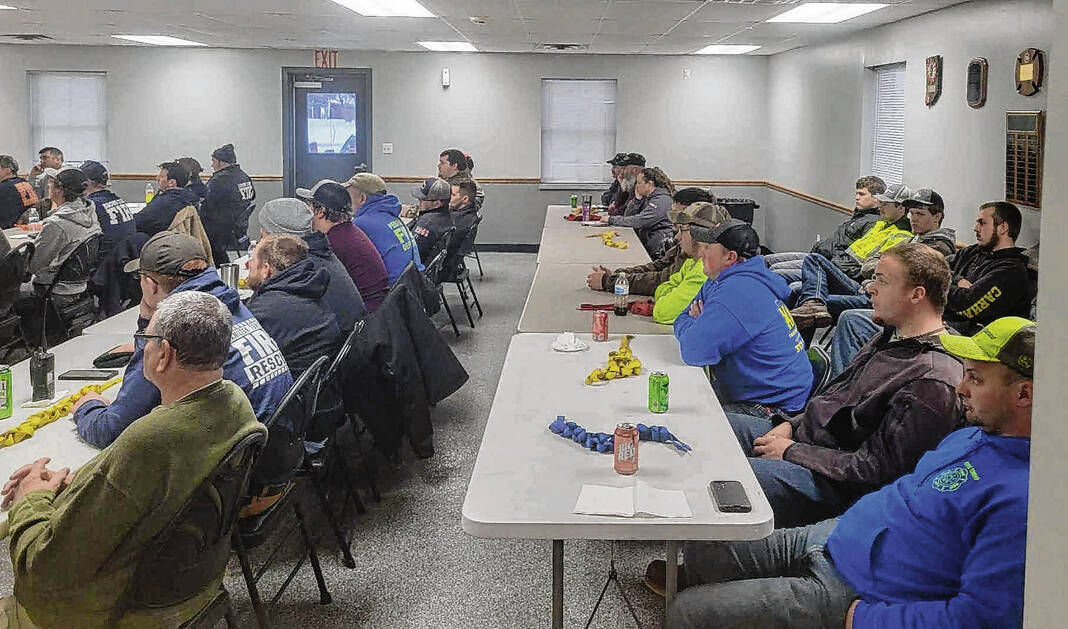
Area first responders take the classroom portion of grain bin rescue training on Jan. 22 at the Hamilton Township Volunteer Fire Department in Cortland.
Photo by Tommy Hoffmeier
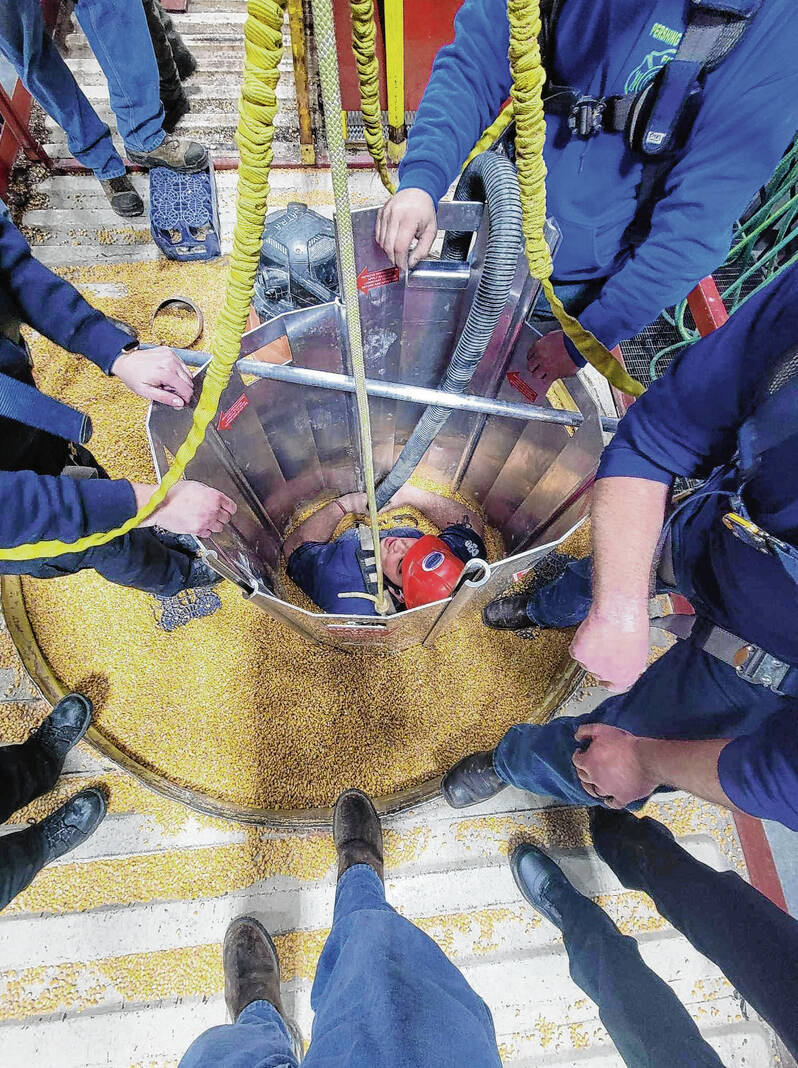
First responders volunteered to be rescued from a grain bin during a grain bin rescue training class Jan. 22 at Premier Ag in Cortland.
Photo by Tommy Hoffmeier
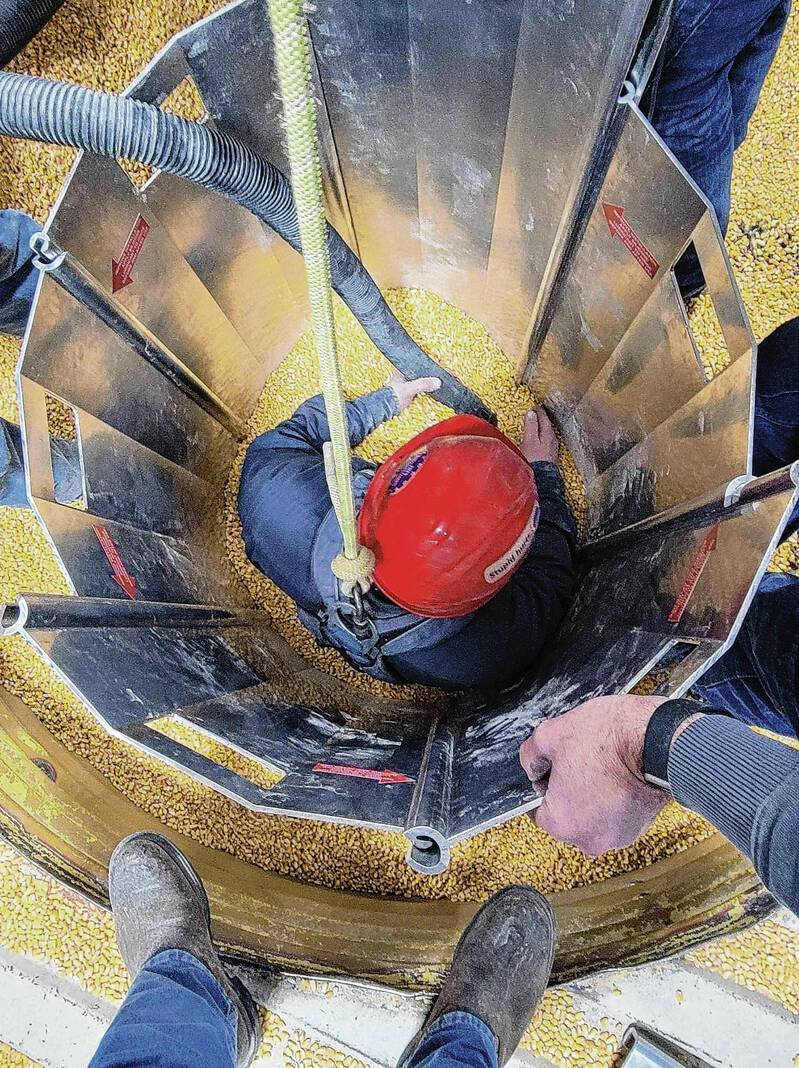
First responders volunteered to be rescued from a grain bin during a grain bin rescue training class Jan. 22 at Premier Ag in Cortland.
Photo by Tommy Hoffmeier
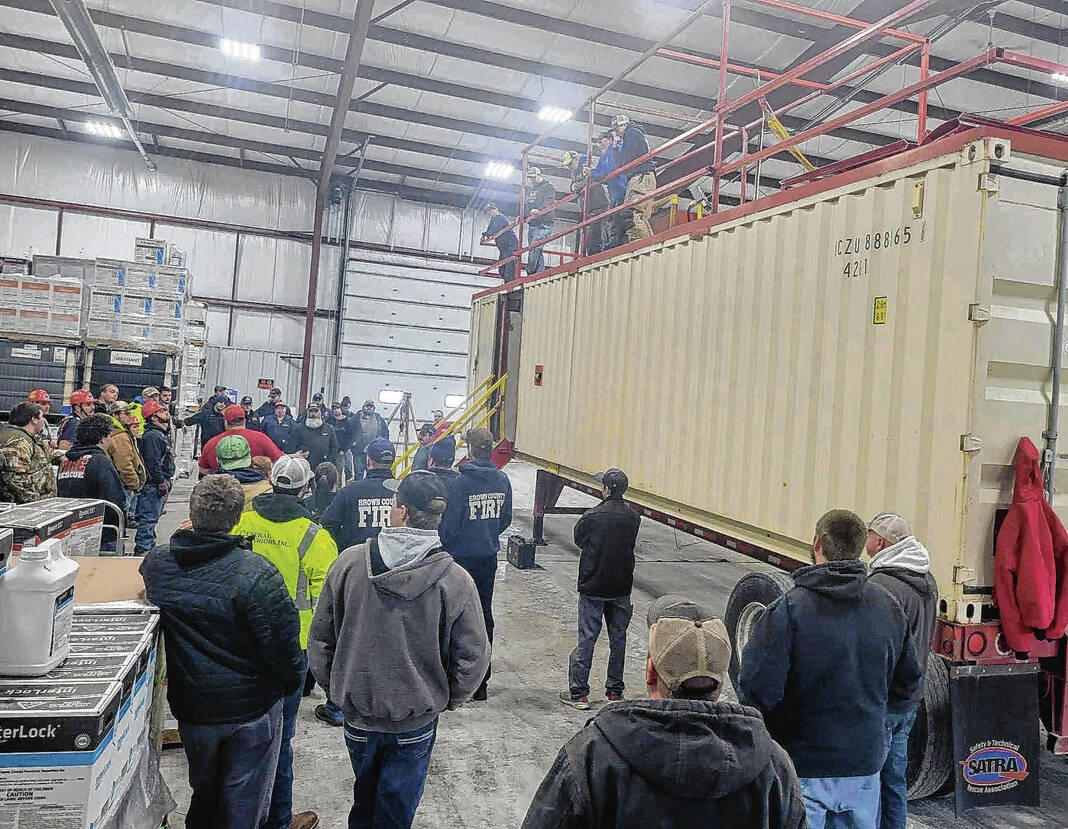
The Safety and Technical Rescue Association of Livonia, Michigan, set up a grain bin rescue training trailer inside Premier Ag in Cortland on Jan. 22 for area first responders and Rose Acre Farms and Benson Hill employees to receive training on grain bin rescues.
Photo by Tommy Hoffmeier
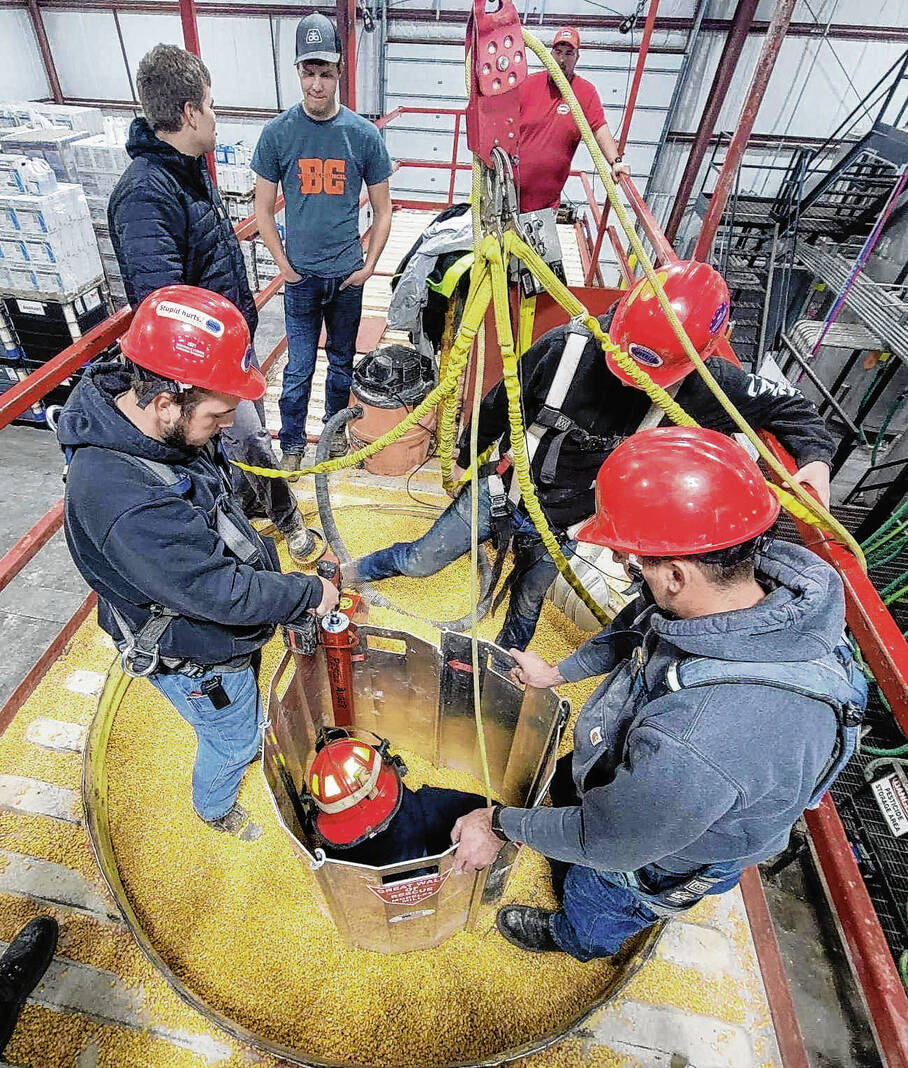
First responders use a grain bin rescue system during training Jan. 22 at Premier Ag in Cortland.
Photo by Tommy Hoffmeier
CORTLAND — Imagine the floor going out from under you.
That’s how Hamilton Township Volunteer Fire Department Lt. Ryan “R.C.” Wayt described the feeling of being engulfed by grain in a grain bin.
Fire Chief Cody Hercamp said once the grain gets above your knees, you can’t pull your leg out. The grain compresses that much.
In their case, this was just grain bin rescue training, not an actual situation.
But now, if they find themselves having to rescue someone from a grain bin, they are trained to do so.
“At least you can explain to the victim what’s going on. You know what they are going through right now, maybe help calm them a little bit until you can get something going to get them out,” Wayt said. “We would be securing (the grain bin rescue system) to keep them from going any deeper. That’s what you do while you’re waiting on the rescue team to get there.”
On Jan. 22, officials with the Safety and Technical Rescue Association of Livonia, Michigan, led training in Jackson County. The rescue training in the classroom took place at the Hamilton Township station in Cortland, and the skills portion was conducted at the nearby Premier Ag facility.
SATRA is a national nonprofit association of experienced, highly trained emergency responders, including firefighters, emergency medical personnel and environmental hazard experts, who are prepared to respond at a moment’s notice to meet any disaster need, both domestically and internationally, according to satra.us.
They train and certify emergency response personnel and coordinate response teams for specific needs and provide community disaster preparedness education for civic groups and schools.
“They bring a big trailer that they’ve made just for this,” Hercamp said of the grain bin rescue training. “They go all across the country training, and they also have a response division that they can be anywhere in the world in 24 hours. They are what I would call subject matter experts on this, and if we have a rescue, we can call them and they will video chat us through everything.”
Hercamp said the training has been done in the county in the past, and his department decided to host it this year after nearby Benson Hill donated The Great Wall of Rescue grain bin rescue system and accessories.
That includes panels that are used to build a wall, or tube, around a person who is trapped in grain, platforms to provide a sturdy base for rescuers, an auger to remove the grain from around the victim after the walls are in place, an insertion step that is used to push the panels in place that also can be used to help the victim climb out of the grain and a removal pipe that is used to help support the victim and remove the panels after the rescue is complete.
Benson Hill also sponsored the recent training, and Premier Companies provided the grain for skills, breakfast, lunch and drinks, resulting in the class being free for the participants. Hercamp said there were 58 first responders from 11 agencies in Jackson, Bartholomew, Brown and Morgan counties taking the class, and 10 representatives of Benson Hill and Rose Acre Farms did the skills portion.
The classroom portion covered basic ropes and knots, confined space entry, rigging systems, how grain engulfment occurs, how to access a grain bin, proper personal protective equipment and lockout/tagout systems.
Participants then applied what they learned in the skills portion, where one person volunteered to go in the grain bin and three others served as the rescue team.
Hercamp said another reason for hosting the training was personal for Hamilton Township. On Nov. 29, 1986, Fire Chief Jack Schafstall was called to Rose Acre Farms after employees noticed a smoldering area in one of the grain bins that the fire department had responded to the week before.
Schafstall and Rose Acre Farms employee Jeffrey Wolff became trapped in the 800,000-bushel grain bin while searching for the hot spot. The bin was about two-thirds full of corn. Following a two-hour rescue attempt, the bodies of Schafstall and Wolff were discovered near the bottom of the bin.
“We kind of hit that story with all of the people in there, and I think it opened up a lot of people’s eyes that this isn’t something that happens everywhere but here. It happened 3 miles down the road,” Hercamp said.
Wayt works at nearby Premier Ag, and he said it has a grain bin system. Plus, after hours, he works on farms that have grain bins, so the likelihood of him experiencing a grain bin incident is a lot higher.
At one point, Hercamp said there were more than 40 grain bins in Hamilton Township. Then there are businesses and farms in other communities around the county that have grain bins.
“These are very high-risk, low-frequency incidents,” Hercamp said. “We have to be very meticulous in how we approach that, and that’s why we have this training. It’s not ‘Hurry up, jump in’ because there are steps you have to take, and we’re probably going to be calling resources from outside of the county.”
Columbus, for example, has rope rescue technicians that would be able to help locally trained first responders with a grain bin rescue situation.
“We’re trying to build that base knowledge for us that we can start a rescue, and if we have to have ropes and stuff, then we get the help coming in,” Hercamp said. “We’re also trying to get some of this stuff. There’s a list of stuff that we need to go along with (The Great Wall of Rescue) to be able to safely and effectively rescue somebody without causing more harm.”
In October 2022, Hercamp said the county’s fire chiefs association started a new dispatch protocol that includes having all trained personnel from various departments around the county respond to a grain bin incident.
Firefighters today don’t just respond to structure fires. They also are called for water rescues, hazardous materials spills and vehicle wrecks and would be called for a grain bin rescue, too.
“It’s just the benefit of further education for us as providers, just as a whole, we can walk away from it knowing something that we didn’t prior to better assist the citizens because that’s what we’re here for,” Hamilton Township Firefighter Tommy Hoffmeier said.
With Jackson County having a large farming community, Hoffmeier said it’s a benefit to the community knowing first responders are trained on grain bin rescues.
“It’s good to know you have that at your back door, that you know that if something were to occur, we’re better equipped to respond,” he said. “Just having the training and being able to be more well-educated in this subject assists the community, and that’s what we’re here for.”
Hercamp was happy with the participation in the recent training.
“We’re constantly trying to think outside the box of how to make basically the entire county better,” he said.
To view a video from the grain bin rescue class, visit facebook.com/htvfd.
